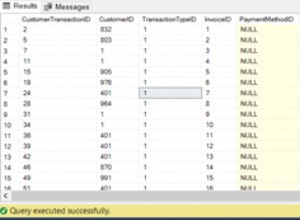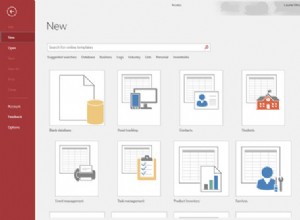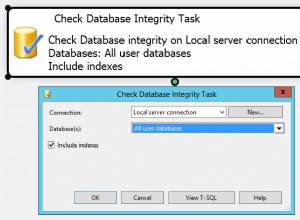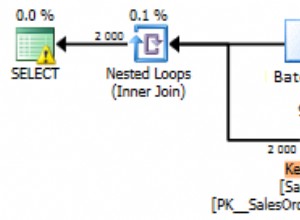Una opción:Empuje la lógica para verificar si una columna está siendo rastreada en el procedimiento f_log y luego pase a través de todas las columnas.
Por ejemplo, si su track_Table contiene (table_name, column_name, allow) valores para cada columna que desea rastrear, entonces algo como esto
CREATE OF REPLACE PROCEDURE f_log( p_id varchar2
,p_table_name varchar2
,p_column_name varchar2
,p_old_val varchar2
,p_new_val varchar2)
as
l_exists number;
cursor chk_column_track IS
SELECT 1
FROM track_TABLE
WHERE upper(TABLE_NAME) = upper(p_table_name)
AND UPPER(column_name) = upper(p_column_name)
AND upper(allow) = 'Y';
begin
open chk_column_track;
fetch chk_column_track into l_exists;
if chk_column_track%found then
--do the insert here
end if;
close chk_column_track;
end;
/
CREATE OR REPLACE TRIGGER trg_TRACK
AFTER INSERT OR UPDATE OR DELETE ON ABC
FOR EACH ROW
DECLARE
n_id varchar(50);
BEGIN
n_id := NVL(:old.id, :new.id);
-- send all of the values to f_log and have it decide whether to save them
f_log(:old.id,'COL1',:old.col1,:new.col1);
f_log(:old.id,'COL2',:old.col2,:new.col2);
f_log(:old.id,'COL3',:old.col3,:new.col3);
...
END;
Y por el amor de Dios, escriba en mayúsculas los valores en su track_table en la inserción para que no tenga que UPPER() los valores almacenados, ¡haciendo inútil cualquier índice en esos valores!
Ahora, esto consumirá algunos recursos al verificar el nombre de cada columna en cada operación, pero si no está ejecutando grandes volúmenes, entonces podría ser manejable.
De lo contrario, necesitará una solución más elegante. Como aprovechar el poder de las colecciones y la cláusula TABLE() para realizar la búsqueda de track_table en una operación masiva. Tenga en cuenta que estoy fuera de mi base de datos en este momento, por lo que no he probado este código.
CREATE OR REPLACE TYPE t_audit_row AS OBJECT (
p_table_name varchar2(30)
,p_column_name varchar2(30)
,p_id varchar2(50)
,p_old_val varchar2(2000)
,p_new_val varchar2(2000)
);
CREATE OR REPLACE TYPE t_audit_row_table AS TABLE OF t_audit_row;
CREATE OR REPLACE PROCEDURE f_log (p_audit_row_table t_audit_Row_table)
AS
begin
-- see how we can match the contents of the collection to the values
-- in the table all in one query. the insert is just my way of showing
-- how this can be done in one bulk operation. Alternately you could make
-- the select a cursor and loop through the rows to process them individually.
insert into my_audit_log (table_name, column_name, id, old_val, new_val)
select p_table_name
,p_column_name
,p_id
,p_old_val
,p_new_val
FROM track_TABLE TT
,table(p_audit_row_table) art
WHERE tt.TABLE_NAME = art.p_table_name
AND tt.column_name = art.p_column_name
AND tt.allow = 'Y';
end;
/
CREATE OR REPLACE TRIGGER trg_TRACK
AFTER INSERT OR UPDATE OR DELETE ON ABC
FOR EACH ROW
DECLARE
l_id varchar(50);
l_audit_table t_audit_row_table;
BEGIN
l_id := NVL(:old.id, :new.id);
-- send all of the values to f_log and have it decide whether to save them
l_audit_table := t_audit_row_table (
t_audit_row ('ABC','COL1',l_id, :old.col1, :new.col1)
,t_audit_row ('ABC','COL2',l_id, :old.col2, :new.col2)
,t_audit_row ('ABC','COL3',l_id, :old.col3, :new.col3)
,...
,t_audit_row ('ABC','COLn',l_id, :old.coln, :new.coln)
);
f_log(l_audit_table);
end;
/




